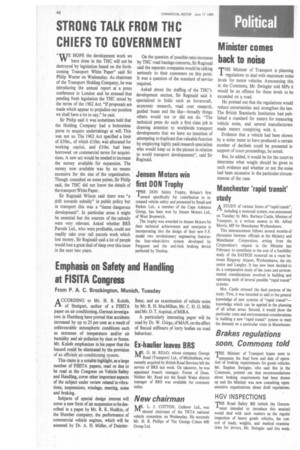Manchester 'rapid transit' study
Page 48

If you've noticed an error in this article please click here to report it so we can fix it.
A STUDY of various forms of "rapid transit",
including a monorail system, was announced on Tuesday by Mrs. Barbara Castle, Minister of Transport, in a written answer to Mr. Alfred Morris, MP for Manchester Wythenshawe.
This announcement follows several months of discussion between officials at the Ministry and Manchester Corporation, arising from the Corporation's request to the Minister last February to contribute to the cost of a feasibility study of the SAFEGE monorail on a route between Ringway Airport, Wythenshawe, the city centre and Langley. It has now been decided to do a comparative study of the costs and environmental considerations involved in building and operating each of several possible "rapid transit" systems.
Mrs. Castle stressed the dual purpose of the study. First, it was intended to add to the general knowledge of new systems of "rapid transit"— knowledge which can be applied in the planning of all urban areas. Second, it would show the particular costs and environmental considerations in building a new "rapid transit" system to meet the demand on a particular route in Manchester.
Brakes regulations soon, Commons told
THE Minister of Transport hopes soon to 'announce the final form and date of operation of braking requirements for goods vehicles. Mr. Stephen Swingler, who said this in the Commons, pointed out that recommendations about braking requirements had been drawn up and the Minister was now consulting representative organizations about draft regulations.
HGV INSPECTIONS THE Road Safety Bill (which the Govern' ment intended to introduce this session) would deal with such matters as the regular inspection of heavy goods vehicles, the control of loads, weights, and medical examinations for drivers, Mr. Swingler said this week.




















































































































































